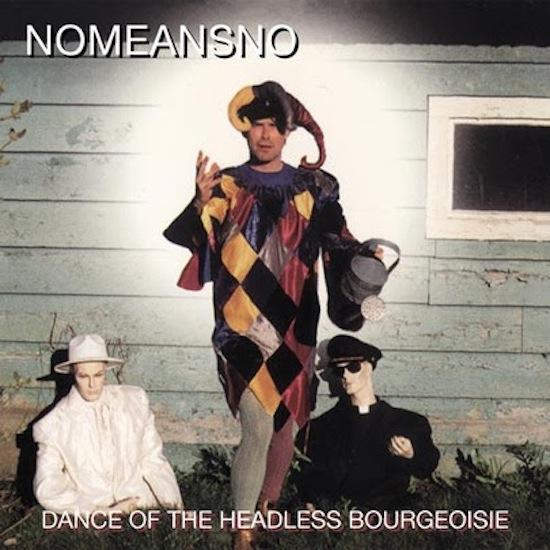Although the general consensus seems to be that 1989s undeniably fantastic Wrong is the best of Nomeansno’s 12 studio albums, the truth of the matter is that there is such an embarrassment and variety of riches amongst their recorded output, that choosing any single one above the others is a very difficult task indeed. Personally I would argue that 1988’s Small Parts Isolated and Destroyed, 1991’s 0+2=1 and 2000’s One, alongside 1998’s Dance Of The Headless Bourgeoisie (here finding its way onto deluxe 180gram vinyl after being out of print for 15 years) all legitimately vie for pole position amongst the band’s releases.
Following on from the comparatively straight (yet still entirely righteous) punk of 1995’s The Worldhood Of The World (as such), Dance of the Headless Bourgeiosie‘s marriage of highly literate lyrical content, dense music with often complex time changes and incredible energy, which nevertheless still manages to pull off some great singalong choruses, seemed to confuse critics at the time who resorted to labelling this many headed mutant beast inadequate names like "jazzcore" or ‘prog-punk’. As for the critic who was inspired to write: "Scientific proof that NoMeansNo has indeed transformed from a tight, aggressive, smart, political band into a dull, meandering punk version of Rush" (AV Club) – one can only assume that they had their ears put on the wrong way ’round in some travesty of random mutation, evolution-wise. Not that Rush are without their own considerable charms, obviously.
Sure there is some incredible virtuosity going on here, mainly in the near-telepathic interplay between brothers John and Rob Wright on drums and bass respectively, but it’s an organic, honed-by-necessity (from their origins as a two-piece) and entirely in the service of their musical aesthetic kind of complexity that puts the band’s rhythm section in a universe of their own. ‘Electric gamelan’ era King Crimson crossed with the Minutemen might be a more accurate comparison, but even that fails to do this music justice. John Wright trained as a jazz drummer (whilst at school) but he certainly gave the impression when I interviewed him last year, that progressive music was never something that was a part of his listening habits. This notion is also mocked on the back cover, now returned to its originally intended position after being switched around on the previously issued CD, with guitarist Tom Holliston dressed as a jester holding out a sign saying "progressive" and hooking his thumb as if hitchhiking.
Whatever label one wishes to apply to it, this is seriously unique and powerful music, spectacularly aggressive in parts, yet simultaneously reflective and thoughtful – as disturbing in terms of its ideas as in its intermittent intensity of volume and velocity. Opening track ‘This Story Must Be Told’ doesn’t waste any time kicking off the proceedings in breakneck (bolts loosened and threatening to tear itself asunder) express-train fashion replete with nihilistic intent: "He rolled his eyes, he laughed and he cried, he said I’d kill myself if I was still alive." ‘Going Nowhere’ is a catchy pop-punk respite and the shortest track on the album at two-and-a-half minutes. ‘I’m An Asshole’ sets out the NmN manifesto of tongue-in-cheek misanthropy, targeting a very specific kind of self-absorbed individual who seems all too ubiquitous these days. ‘Disappear’ deploys a blues-like groove descending by degrees into murkier territory with aggressive vocal growls, and even a smattering of honky-tonk piano keys.
The title track itself is an enormously malevolent slab of musical and lyrical atrocity, dark even by NmN’s own standards and offers one of the few instances where their trademark pitch black humour only serves to make matters more disturbing, although I have to admit to laughing at the severed finger joke. The lengthy ‘The World Wasn’t Built In A Day’ is one of the album’s clear highlights, an existential cry of anguish performed as a droning, reverberating lament whose central character seems uncertain as to whether being the last man left alive would be a terrible curse or the ultimate blessing. Following on from such pitch darkness, ‘I Can’t Stop Talking’ appears a joyously hyperactive depiction of a kind of individual we all perhaps know (or is it that voice inherent in all of us that the song takes aim at?): "The why, the who, the where, the when / Let me repeat them all again/And then again my voice will sing / The praises of its babbling." I have to admit to usually skipping the next track – there’s just something too disturbing about the chorus of ‘The Rape’ to warrant blasting it out at any kind of significant volume no matter how you feel about your neighbours. ‘Give Me The Push’ aims for a kind of dervish-like delerium driven by an exhausting vortex of guitar, bass and drums that makes the listener’s mind feel as though its been put through the washing machine on full spin-cycle. ‘One Fine Day’ feels a little ordinary in comparison to the preceding tracks, coming off more like a Husker Du outtake than anything else on the record.
Additional tracks ‘Youth’ and particularly ‘Life-Like,’ originally available on the Alternative Tentacles double LP, are worthy of re-inclusion, the latter with its uplifting keyboard loop a welcome palate cleanser after the album’s bleaker moments. All in all, this is an essential reissue for Nomeansno fans and my only slight complaint is that it isn’t on coloured vinyl like the reissue of 0+2=1. I can only hope that One (with its incredible interpretation of Miles Davis’ ‘Bitches Brew’) is the next in line for the vinyl treatment.


